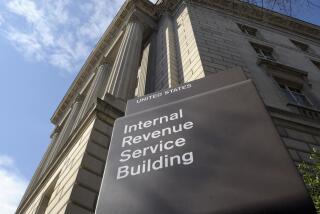Editorial: Give U.S. multinationals an incentive to not dodge taxes

When is a U.S.-based company not considered a U.S. company by the IRS? When it buys a smaller firm in a foreign country and — presto chango! — deems that company to be its parent, escaping the obligation to pay taxes to the U.S. Treasury on its foreign earnings. This process, called “inversion,” is becoming increasingly popular among U.S. multinationals, drawing howls from lawmakers and the Obama administration. But a quick legislative fix won’t last long. That’s because the larger problem is a uniquely flawed U.S. tax code that encourages multinationals to engage in all sorts of accounting gimmickry.
While every other developed nation taxes companies only on the profits they make locally, the United States also taxes U.S.-based multinationals on every dollar of profit earned internationally. Those taxes are due when the companies bring their foreign profits back to the United States. And because the top U.S. corporate tax rate — 35% — is the highest in the developed world, companies can face a big tax bill even after claiming a credit for the foreign taxes they’ve already paid.
To avoid this hit, many U.S. multinationals have parked billions of dollars overseas, unused. Meanwhile, a small but growing cadre is seeking to acquire companies in foreign countries with much lower tax rates, then invert their ownership. Examples include medical device maker Medtronic, pharmaceutical company AbbVie and even the drugstore chain Walgreens.
There was a wave of inversions in the 1990s as well, prompting a crackdown from Congress in 2004. But lawmakers exempted deals in which shareholders of the foreign company acquired more than 20% of the combined company’s stock, opening the door to the current surge. The administration wants to raise the threshold to more than 50% of the combined company’s stock, effectively barring companies from shedding their U.S. status unless they are taken over by a foreign firm.
The obvious problem with that approach is that it would encourage companies to move their headquarters out of the United States or invite foreign takeovers. As long as the U.S. tax code is so much harsher than the rest of the developed world, multinational corporations will find a way around it. A Band-Aid like the administration’s proposal might put a temporary crimp in one particular tax dodge, but solving the larger problem over the long term requires eliminating loopholes, broadening the tax base and lowering rates to more competitive levels. One idea advanced by District Economics Group, a tax consultancy in Washington, is to treat multinational corporations the way most states treat multi-state companies: by apportioning global profits according to percentage of sales made in each country, and taxing just the U.S. amount. It will take that sort of sweeping change to rid the tax code of the incentive to turn a U.S. company into something it’s not.
Follow the Opinion section on Twitter @latimesopinion
More to Read
A cure for the common opinion
Get thought-provoking perspectives with our weekly newsletter.
You may occasionally receive promotional content from the Los Angeles Times.






